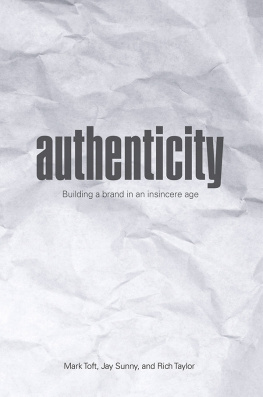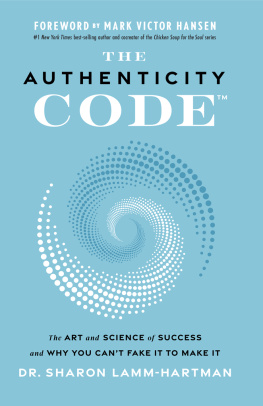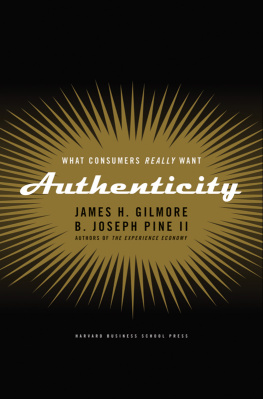]>
]>
Copyright 2019 Anna Crowe
All rights reserved.
ISBN: 978-1-5445-0252-6
]>
To the younger version of me, who struggled so hard to be herself.
Also, to my husband and kids.
]>
Contents
]>
Real isnt how you are made, said the Skin Horse. Its a thing that happens to you. When a child loves you for a long, long time, not just to play with, but really loves you, then you become real.
]>
Does it hurt? asked the Rabbit.
]>
Sometimes, said the Skin Horse, for he was always truthful. When you are real you dont mind being hurt.
]>
Does it happen all at once, like being wound up, he asked, or bit by bit?
]>
It doesnt happen all at once, said the Skin Horse. You become. It takes a long time. Thats why it doesnt happen often to people who break easily, or have sharp edges, or who have to be carefully kept. Generally, by the time you are Real, most of your hair has been loved off, and your eyes drop out and you get loose in the joints and very shabby. But these things dont matter at all, because once you are Real you cant be ugly, except to people who dont understand.
Margery Williams Bianco, The Velveteen Rabbit
]>
Introduction
The privilege of a lifetime is to become who you truly are.
C. G. Jung
Its no secret (or surprise) that professional environments look quite different today than they did two to three decades ago. Back then, people wantedand neededto be managed differently because they thought differently. Job satisfaction was nice to have, but it wasnt considered imperative. Work was a necessary part of life, and bringing home a steady paycheck was just as motivating for younger employees as it was for older ones. When people found a position that gave them a sense of security and satisfied their basic financial needs, they tended to stay put. Love it? No. But leave it? Never. Most employees primary motivation in this antiquated working environment was the professional goals leadership set for them. The recognition of these goals through raises and promotions was viewed as the marker of success. Generations today (X, Y, Z, and everything in between) are motivated by so many other factors, including freedom, connections, the why behind their work, and the ability to fulfill their personal passions through work. People are looking for authenticity in their lives and careers. They want to work for companies that value authenticity and allow them to flourish as individuals.
This shift toward authenticity changes everything. When we were living in a goal-oriented business world, everything was done by the book, which meant every person in the company was managed in the same way. Little thought was given to who employees were as individuals, where they came from, how they might prefer to be managed, or what their unique gifts and aspirations were. For the younger generations in the workforce today, as well as those in older generations who have evolved with the times, this style is no longer effective. Companies who recognize this and do something about it are the ones that are flourishing.
For the often-cited Millennials (and now post-Millennials, known as Gen Z), a large part of job satisfaction hinges upon enjoying their day-to-day work life and engaging with their coworkers. These people want to feel like they can thrive in their work environment, not only materially, but also mentally and emotionally. Todays employees want to work in an atmosphere where they can create trust and build relationships. They want to show the world who they are and be accepted for their unique strengths, abilities, and even quirks. And those are just some of the reasons authenticity in the workplace is so important. Theres no better way to facilitate trusting relationships than by breeding authenticity and transparency.
Youve heard the old saying, Its lonely at the top. In todays world, it cant be lonely at the top because we have to consider our entire team as cohorts in the trenches alongside us. Steve Jobs didnt create and grow Apple alone. As author Harvey McKay puts it, Even the Lone Ranger didnt do it alone. To achieve meaningful and lasting success, organizations must focus on corporate culture, employee engagement, and employee happiness, in addition to the products or services they offer externally. Fostering authenticity among team members, within leadership, and as an integral part of your product or service is a big part of this.
Throughout my twenty-year career, Ive worked for all sorts of different companiesbig brands, startups, you name it. Ive learned a ton of lessons and seen a variety of scenarios in the process. Recently, I decided to interview a handful of top-performing companies and business leaders, which youll be hearing about in the pages to come. One thing Ive noticed, both in my own experience and the experience of others, is that all successful businesses and leaders thrive by creating a culture of trust. In this sort of culture, employees of all levels are not afraid to speak the truth. Theyre not afraid to ask for help. Business leaders have begun to recognize a direct correlation between employee engagement and company success. Go figure.
Employees who work in authentic corporate environments feel freer to share their ideas, and tend to be more loyal and productive. Theres little reason to look elsewhere for employment when theyre happy, fulfilled, and see a clear growth path. Because employees understand where both their peers and management are coming from, and always know where they stand, conflict-ridden and superficial relationships fall by the wayside. This doesnt mean you have to be BFFs with your coworkers, but it does mean you should consider who they are as individuals. Everybody wins when each person can be him- or herself, and we can interact with one another as the unique people we are. This is how teams are created in the true sense of the word, not just corporate-speak.
Authentic Teams Build Authentic Brands
One thing Ive noticed, both as an employee and as a consultant, is that the same companies that breed transparency in their culture also tend to create the most authentic brands. Brand authenticity is becoming more important with each passing day, thanks to Instagram, Snapchat, and other social media outlets. We are more interconnected today than ever before. The more genuine a brand is, the better connection it can create with its customers.
Companies that havent yet adapted to this new, genuine way of doing business present themselves as one thing, but are another in practice. Their mission isnt supported by their products, services, or culture. Todays customers are savvy enough to see through these discrepancies, and its not a good look.
For a brand to be authentic, everything about it has to be real. This means everythingnot just its core offering, but its mission, vision, and actions as well. If customers dont trust a brand, it doesnt matter what the product is, where its sold, or how its priced. A sustainable business cannot be built upon a foundation that isnt genuine.
Brand authenticity creates the building blocks of a trusting, long-term relationship with customers. It ensures that there will never be any confusion about who a company is and what it stands for. This doesnt mean that a business cant evolve and change, or do things differently over time. Every business should embrace innovation. However, what matters most is connecting with customers and creating trust. And the only way to do that is byyou guessed itbeing authentic.
Next page









